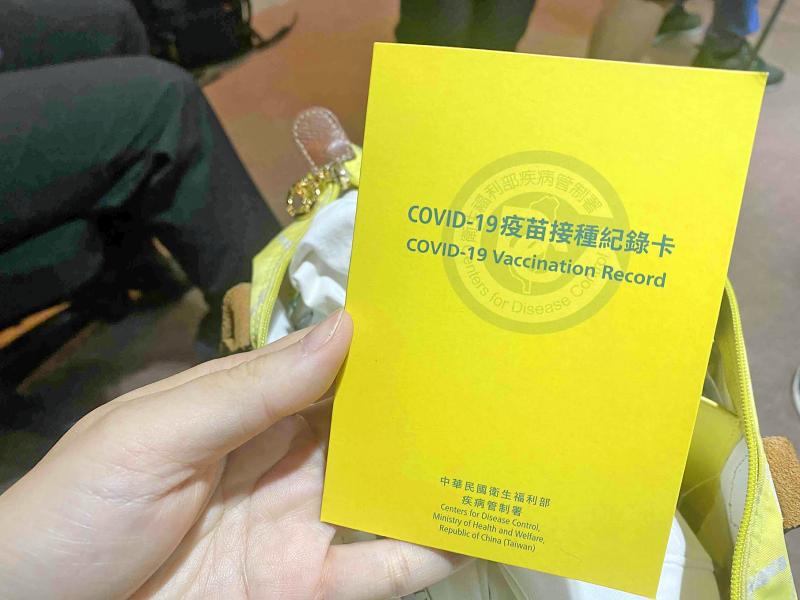Taipei Mayor Ko Wen-je (柯文哲) and New Taipei City Mayor Hou You-yi (侯友宜) on Saturday proposed implementing a “COVID-19 pass” regulation that would allow only vaccinated people into certain areas.
New Taipei City is planning to require a “COVID-19 pass” for entry to “vulnerable spaces” to prevent the spread of COVID-19, Hou said.
Non-students entering elementary schools in New Taipei City are required to show their COVID-19 vaccination cards or proof of a recent negative COVID-19 test. This is for the protection of students under the age of 12, who are not eligible to receive a COVID-19 vaccine, city officials have said.

Photo: Huang Hsu-lei, Taipei Times
The city government would consult with experts before deciding whether to include other venues, such as stores and government buildings, Hou said, adding that eateries are not being considered for the time being.
Meanwhile, Ko said that a “COVID-19 pass” could be used to exempt vaccinated people from some disease prevention rules, such as wearing a mask while exercising in a public area.
The National Parent Educator Volunteer Association yesterday in a statement supported the proposals, adding that before a digital COVID-19 pass can be implemented, both city governments should at least require people to show their COVID-19 vaccination cards when entering schools to ensure students’ safety.
Minister of Health and Welfare Chen Shih-chung (陳時中) on Saturday said that the city governments must ensure that people’s personal freedoms are safeguarded.
Chen said the central government is also planning to introduce new regulations pertaining to the digital COVID-19 certificate that is being used mainly for overseas travel.
The digital certificate, which became available in Taiwan on Jan. 1, serves as proof of vaccination and COVID-19 test results.
Chen said local governments are free to adopt their own rules regarding the use of digital COVID-19 certificates, as long as they do not infringe on people’s freedom and human rights.
Taiwan has tightened its mask mandate nationwide, as dozens of locally transmitted COVID-19 cases have been reported since Jan. 3.
It has also adjusted its border control measures, requiring passengers arriving on long-haul flights to wait at the airport until their COVID-19 test results become available.
The central government has also shortened the recommended time between a second dose of a COVID-19 vaccine and a booster shot from five months to 12 weeks.
Additional reporting by Rachel Lin

A magnitude 7.0 earthquake struck off Yilan at 11:05pm yesterday, the Central Weather Administration (CWA) said. The epicenter was located at sea, about 32.3km east of Yilan County Hall, at a depth of 72.8km, CWA data showed There were no immediate reports of damage. The intensity of the quake, which gauges the actual effect of a seismic event, measured 4 in Yilan County area on Taiwan’s seven-tier intensity scale, the data showed. It measured 4 in other parts of eastern, northern and central Taiwan as well as Tainan, and 3 in Kaohsiung and Pingtung County, and 2 in Lienchiang and Penghu counties and 1

FOREIGN INTERFERENCE: Beijing would likely intensify public opinion warfare in next year’s local elections to prevent Lai from getting re-elected, the ‘Yomiuri Shimbun’ said Internal documents from a Chinese artificial intelligence (AI) company indicated that China has been using the technology to intervene in foreign elections, including propaganda targeting Taiwan’s local elections next year and presidential elections in 2028, a Japanese newspaper reported yesterday. The Institute of National Security of Vanderbilt University obtained nearly 400 pages of documents from GoLaxy, a company with ties to the Chinese government, and found evidence that it had apparently deployed sophisticated, AI-driven propaganda campaigns in Hong Kong and Taiwan to shape public opinion, the Yomiuri Shimbun reported. GoLaxy provides insights, situation analysis and public opinion-shaping technology by conducting network surveillance

‘POLITICAL GAME’: DPP lawmakers said the motion would not meet the legislative threshold needed, and accused the KMT and the TPP of trivializing the Constitution The Legislative Yuan yesterday approved a motion to initiate impeachment proceedings against President William Lai (賴清德), saying he had undermined Taiwan’s constitutional order and democracy. The motion was approved 61-50 by lawmakers from the main opposition Chinese Nationalist Party (KMT) and the smaller Taiwan People’s Party (TPP), who together hold a legislative majority. Under the motion, a roll call vote for impeachment would be held on May 19 next year, after various hearings are held and Lai is given the chance to defend himself. The move came after Lai on Monday last week did not promulgate an amendment passed by the legislature that

AFTERMATH: The Taipei City Government said it received 39 minor incident reports including gas leaks, water leaks and outages, and a damaged traffic signal A magnitude 7.0 earthquake struck off Taiwan’s northeastern coast late on Saturday, producing only two major aftershocks as of yesterday noon, the Central Weather Administration (CWA) said. The limited aftershocks contrast with last year’s major earthquake in Hualien County, as Saturday’s earthquake occurred at a greater depth in a subduction zone. Saturday’s earthquake struck at 11:05pm, with its hypocenter about 32.3km east of Yilan County Hall, at a depth of 72.8km. Shaking was felt in 17 administrative regions north of Tainan and in eastern Taiwan, reaching intensity level 4 on Taiwan’s seven-tier seismic scale, the CWA said. In Hualien, the